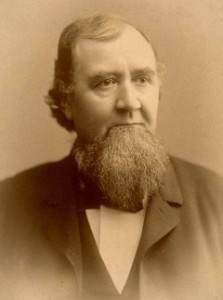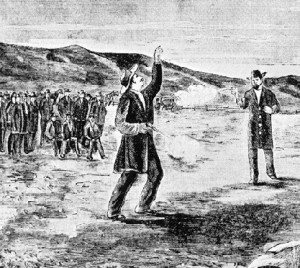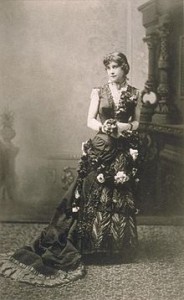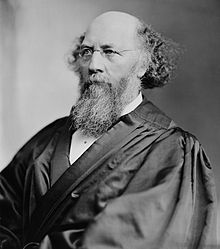David Smith Terry was truly a man of his time and place – Texas and California in the early to mid-19th century. He possessed a large portion of the same intelligence, ambition, and physical courage which distinguished many of his contemporaries, as young men in tumultuous times. Alas, such qualities were offset by a pig-headed conviction of his own righteousness, a boiling-hot temper readily provoked to violence, and one more weakness, which would eventually prove fatal to David Smith Terry; he was all too ready to act on impulse without regard for consequence.
He was of a generation born into a relatively new country, with no memory of colonial rule by Britain, or the revolution itself, save perhaps for passed-down recollections of his maternal and paternal grandfathers, who had both fought in it with distinction. David S. Terry was the second of four sons of Clinton Terry and Sarah Smith Terry. The Terry marriage does not appear to have been a particularly successful one; they separated in 1835, when David Terry would have been about eight years old. Sarah Terry must have been a woman of spirit and determination, for she moved with her four sons to Texas in that same year, apparently hoping to retrieve some portion of respectability and income which had been lost through her husband’s mismanagement – mismanagement which must have been on a fairly epic scale to leave her in possession of their remaining property and custody of their sons. She and her sons established a plantation west of the present-day city of Houston, where they planted cotton and waited for prosperity to bless them once more. Instead, Sarah Terry died, shortly thereafter, leaving her sons – the oldest, Benjamin being fifteen, and David thirteen – essentially orphaned in the war and rebellion which followed.
David, large for his age and already impetuous, enlisted in Sam Houston’s army of Texans at Gonzales, following the fall of the Alamo. Reputedly, he fought at San Jacinto with considerable distinction. When Texas won a shaky independence by Houston’s victory, David S. Terry returned home to the cotton plantation – but not for long. He took up the study of law in the office of a relative by marriage, was admitted to the bar and practiced in Galveston for some years. He was described as a tall, handsome gentleman, solidly built, with steel-grey eyes under heavy brows, and sandy hair brushed back from a high forehead. He sported chin-whiskers but no mustache. Naturally rather reserved, he could be animated in conversation when the topic interested him, and very good company. He identified passionately as a man of Southern sympathies and as a Texan; to that end, he usually carried a sheathed hunting knife of the design made popular by Jim Bowie.
He went soldiering again, in the Mexican-American war, serving in Colonel Jack Hays’ regiment of Rangers. He participated in the battle before Monterrey, and upon returning to Galveston at the end of that war, became interested in politics. In 1847, he ran for the office of district attorney for Galveston and lost. This defeat may have been felt in a stinging fashion; two years later, he joined together with some of his Ranger comrades and followed the Gold Rush to California. He tried gold-mining for a brief time, didn’t care for the experience, (as did most men with a more readily-profitable trade who did not immediately strike it rich) and set up practicing as a lawyer again in Stockton, California. There he dabbled in running for local office, this time as mayor. Just as before, in Galveston, he was defeated, and thereafter for a time returned to the practice of law. He prospered sufficiently over the next few years that he could afford to return east and marry a distant cousin-by-marriage, a Miss Cornelia Runnels. She was educated, well-mannered; the perfect gentle Southern belle, twenty-three to her husband’s twenty-seven. She is supposed to have influenced him greatly, and as the decade progressed, David Smith Terry went from success to success. Sadly, of their six children – all sons – only three survived to adulthood; of those, one died as a teenager in a hunting accident and the other at the age of thirty or so.
As for David S. Terry’s professional prospects, in 1855 the laurels of high political office finally descended on his noble brow in the form of a position on the California Supreme Court. But controversy dogged his footsteps; in a tense interlude during San Francisco’s second bout of organized Vigilante activity, he lost his temper. He was not a supporter of the Vigilance Committee, which had been created by otherwise sober and law-abiding citizens in the wake of what appeared to be flagrant abuse of the law by elected and appointed authorities. Being one of those elected and appointed authorities – although personally incorruptible – Judge Terry did not approve of other parties interfering. An altercation ensued, when he and others who objected to amateurs taking the law into their own hands paid a visit on the Vigilance Committee. When a posse of Vigilance Committee members led by Sterling Hopkins attempted to arrest two members of Judge Terry’s group, Judge Terry most intemperately stabbed Hopkins in the throat with his Bowie knife. Arrested in turn himself, he must have had a nervous couple of days, waiting to hear if Sterling Hopkins’ wounds were mortal. Fortunately for both men – they were not. Alas, in coming years, Judge Terry’s temper remained as uncontrolled as ever.
The matter of slavery – whether it was to be allowed in prospective new states of the Union and under what conditions if any – roiled California every bit as deeply and violently as it did elsewhere. There, the established Democrat party in California split into pro and anti-slavery factions. Not entirely unexpectedly given his origins and background, Judge Terry was vociferously on the pro-slavery side. Given that, and his intemperate nature, he was bound to clash with the anti-slavery side, personalized by his former friend and now US Senator David C. Broderick. Inflammatory accusations were exchanged, deep offense was taken … and a formal duel agreed on by the aggrieved parties. On September 12, 1859, they met in a place which is now a city park, but which then was outside San Francisco’s city limits. Judge Terry won the coin toss, allowing him to select a set of dueling pistols … which had hair triggers. Supposedly, Senator Broderick was warned of this by the neutral party who examined the pistols – but as the two men squared off, Broderick’s pistol accidently discharged. This left Judge Terry to take his own sweet time in taking aim at Broderick.
Mortally wounded, Senator Broderick fell; he died three days later – a martyr to the anti-slavery cause. Judge Terry was charged, but acquitted. His career in public office – although not his profession as a lawyer – being pretty well trashed, in the eyes of indignant anti-slavery partisans and perhaps those who disapproved of dueling, or of a duelist taking savage and unsporting advantage of a hair-trigger misfire – remained relatively untarnished. He returned to that practice for a time, but on the outbreak of the Civil War, picked up his sometime occupation as a soldier, in which practice an affinity for dealing out sudden fatal violence was – if not more acceptable – conceded to be more generally useful.
Returning to Texas, he proceeded to join the Confederate Army – for which his older brother Benjamin had raised a swashbuckling cavalry regiment official known as the 8th Texas Cavalry, and popularly as Terry’s Texas Rangers, which served valiantly throughout the war in the west of the Appalachian theater. Benjamin Terry was killed in nearly their first skirmish, late in 1861, another Terry brother perished at Shiloh and David Terry was wounded at Chickamauga. He finished the war as a colonel, lay low for a time in Mexico, as did certain other die-hard Confederates … but in 1865, he returned to California and the practice of law as if nothing had ever happened. Time and experience appeared to have chastened him, or at least taught him to rein in the temper, for by the end of a decade after his return, he was a respected member of the California Constitutional Convention, revising the original state constitution.
And then, fate played the femme fatale card on David Terry, jurist, judge, colonel of cavalry and man of the world. He took on a client of the type usually termed as an ‘adventuress’ in the 19th century and a gold-digger in the early 20th, terms which usually hint at a degree of daring and amorality – a woman bent on playing high-stakes poker in the grand game of life. She was Sarah Althea Hill, an orphan of a respectable and prosperous family in Cape Girardeau, Missouri. In 1871, when she was twenty-one, Sarah Althea and her older brother came to San Francisco to live with relatives. Sarah, in the parlance of the time, was ‘fast’ and in the next decade, she burned through the inheritance from her parents of $20,000 dollars. (From modern calculations, this would have been anywhere from a quarter to over half a million.) Sometime around 1880, Sarah Althea made the acquaintance of a very, very rich man – William Sharon, a ‘49er, financier, silver-mine magnate, real-estate tycoon, hotelier, and for two terms, US Senator representing Nevada. He was at that time in his sixties, a widower … and as noted, filthy rich. They became attached, to which precise degree became a matter for spectacular and scandalous legal wrangling in various courts for the next five years.
Seriously, the courtroom antics would have made a spectacularly tacky real-world TV series, beginning when Sarah Althea Hall had William Sharon arrested on charges of adultery, and proceeded to sue him for divorce, demanding alimony and a generous share of his property due her as an aggrieved ex-spouse. The resulting legal wrangling enthralled the readers of tabloids across the nation. Sarah Althea insisted they had been secretly married and she had a signed contract to prove it – secrecy necessary because he was running for reelection at the time, and wished to keep it all quiet lest his other mistress hear about it and create an embarrassing scandal. William Sharon insisted, indignantly, that Sarah Althea had merely been his generously compensated mistress and any such contract alluding to a marriage between them was a forgery. After a year of bitter legal wrangling, a judge ruled in favor of Sarah Althea, declaring her to have been William Sharon’s legal wife, and to have a right to such of his wealth accumulated since their presumed marriage. Coincidentally, Cornelia Terry, David Terry’s long-suffering wife died at the same time.
The appeals and countersuits commenced immediately, continued by William Sharon’s son and son-in-law after his death a year after the judgement. Meanwhile, the presumed Mrs. Sharon married her now-widowed and very much older lawyer, and together they zestfully embarked on another round of legal hearings on whether William Sharon and Sarah Althea Hill had been truly and legally man and wife … only the next time, the circuit judge hearing the case – Associate Justice Stephen Johnson Field, of the US Supreme Court – appeared distinctly unsympathetic. Sarah Althea, in a breach of court etiquette, loudly accused Judge Field of having been “bought” by the Sharon interests in the case. A fracas ensued, with David Terry drawing his Bowie knife in her defense. Both Terrys scuffled with US marshals, were forcibly removed from the courtroom, arrested and slapped with jail sentences by Judge Field, who thereafter earned the bitter enmity of the pair. The threats against him by the Terrys were taken so seriously, that when next Judge Field ventured to California in the late summer of 1889, he was accompanied by a US marshal as his dedicated body-guard.
Whether it was coincidental or not, Judge Field and his body-guard, David Neagle, were traveling from Los Angeles to San Francisco train, on August 14th, 1889. Coincidentally, the Terrys had also boarded that train, somewhere along the way. When the train stopped for breakfast at the station restaurant in Lathrop (a town a little south of Stockton), the Terrys discovered the presence of the judge … although perhaps not his bodyguard; a fatal omission, considering subsequent events. But given the hot and irrational tempers displayed throughout the lives of both David Terry and Sarah Althea, this was absolutely guaranteed not to end well or without bloodshed. David Terry approached Judge Field, peacefully eating breakfast, and without warning, slapped him across the face.
Marshal Neagle – who had previously been a town marshal and deputy sheriff in the rowdy municipality of Tombstone, Arizona, during it’s the wildest and most wooly stage – leapt to his feet and drew his own weapon as David Terry reached inside his own coat. Marshal Neagle shot David Terry twice – dropping the former judge dead in the middle of the railroad restaurant. So ended the life of a man who otherwise might have been better known for nobler things – save that he had a wicked and impulsive temper, and fell for a woman who had even more problems with violence and impulse-control than his own.
The post-script? There was a resulting US Supreme Court case, which decided that yes, the Attorney Genera of the US did have the authority to appoint US Marshals as bodyguards to Supreme Court Justices. Sarah Althea Hill (Sharon) Terry – who it might be inferred – had substantial mental health issues, was eventually confined to an institution, where she died of natural causes some forty years later. She was buried in the Terry family plot, in a cemetery in Stockton, California. A granddaughter of David S. Terry came forward and approved, at the time of her death.





Recent Comments